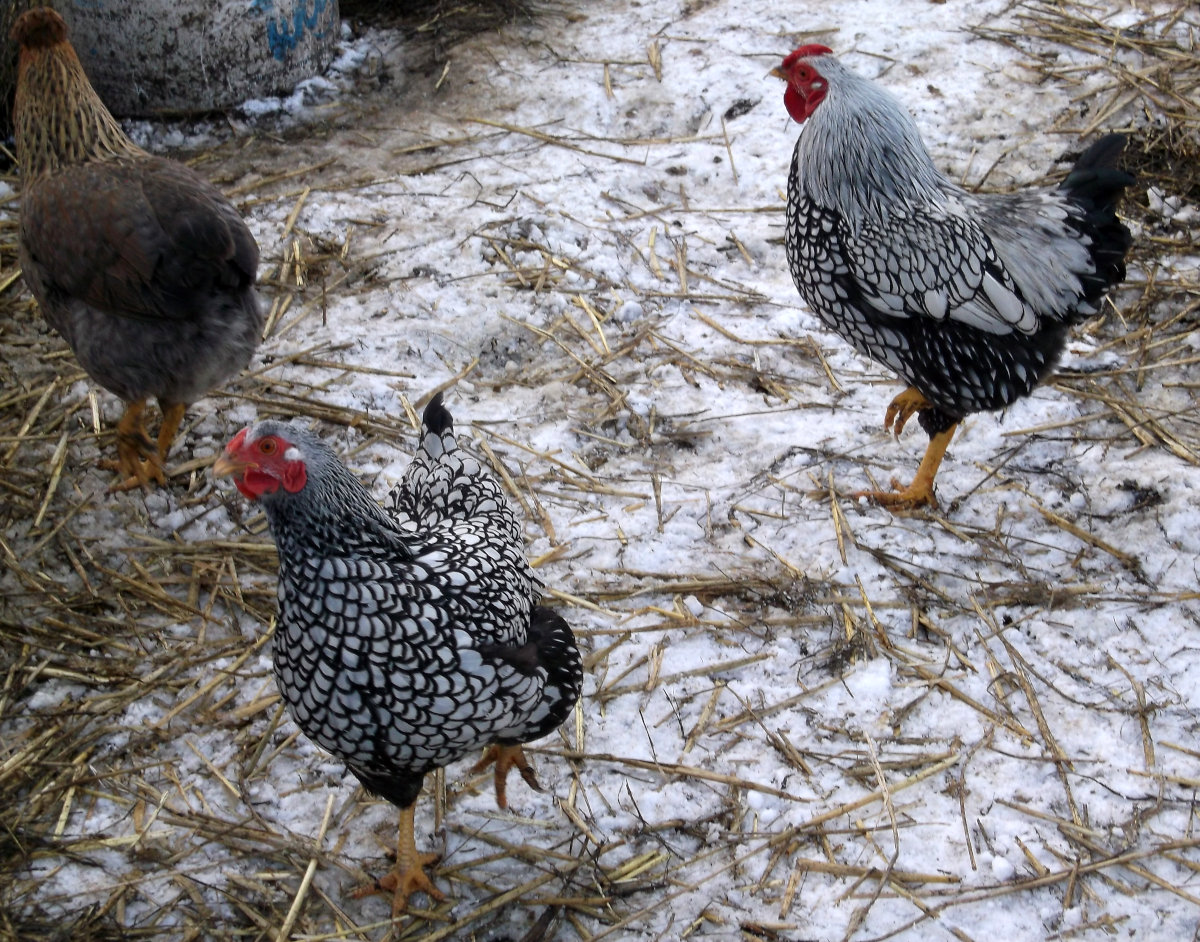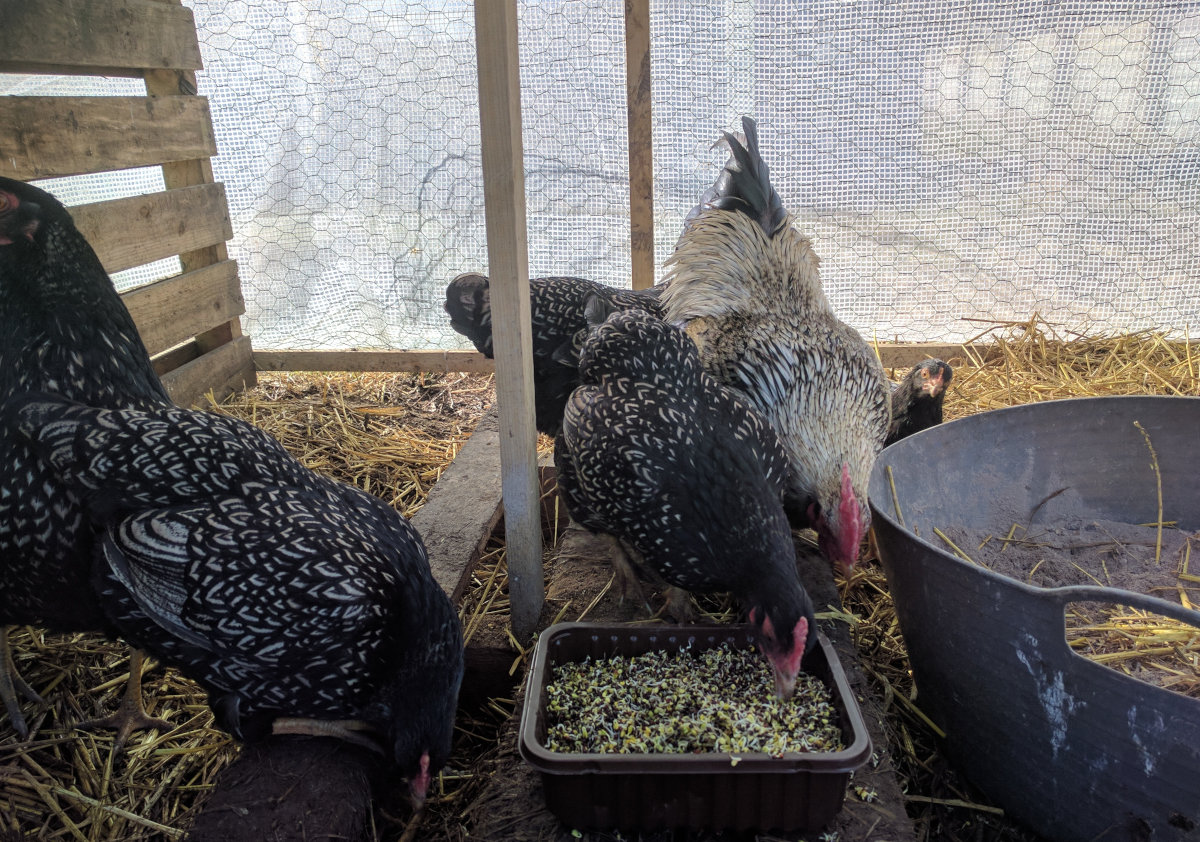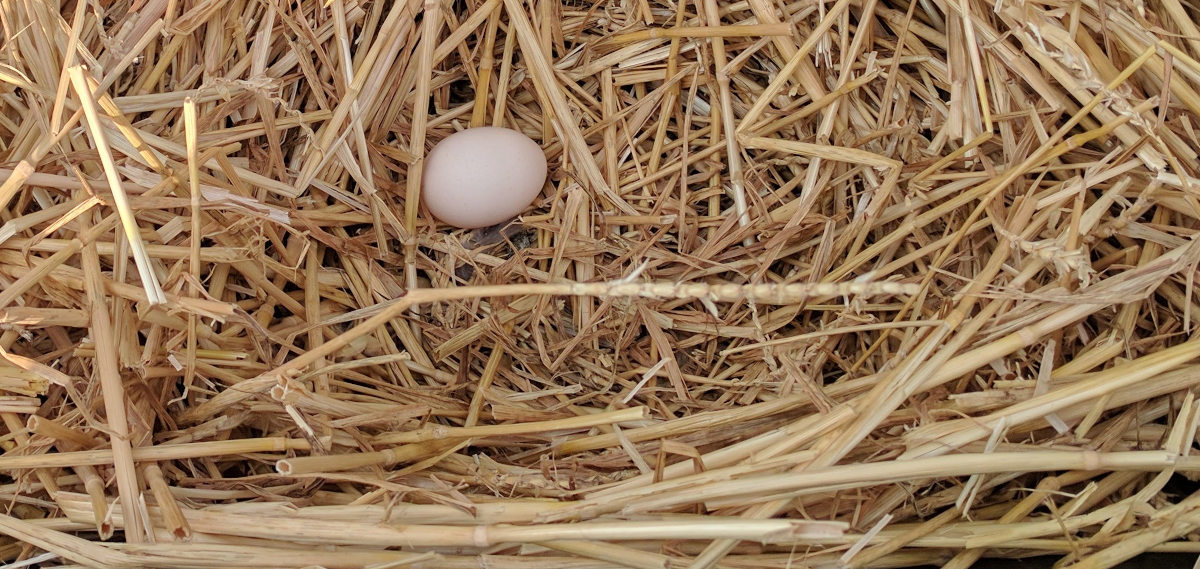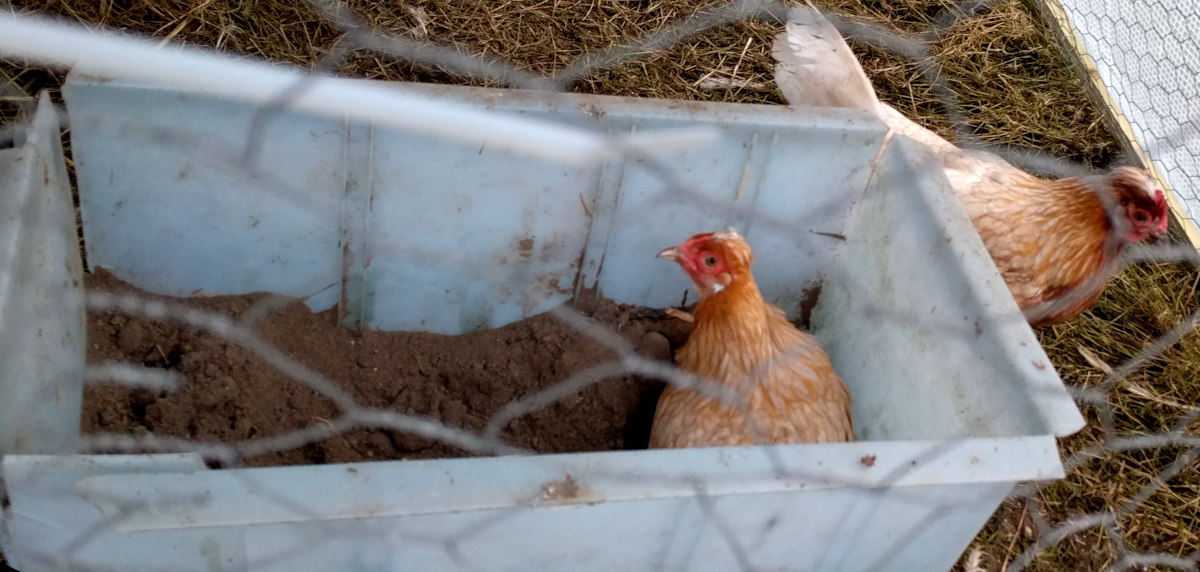What chickens need in winter. And how I provide it.

In order to keep chickens healthy and comfortable during the winter season, there are several essential items and practices that are considered must-haves:
What are must haves for chickens in winter?
Where I live here can be as little as 5 hours of daylight in the depths of winter.
I try to make use of what little sun there is in winter: Chickens cope remarkably well in the cold, especially if properly fed and kept dry. I let mine into the poly tunnel in the winter months.
Shelter: A secure and insulated coop is crucial to protect chickens from harsh weather elements like cold winds, rain, and snow. A covered run also helps keep the ground mud free.
Below: A winter coop and run for my chickens. Movable, with thicker bedding and an indoor dust bath.

The coop should be well-ventilated to prevent moisture buildup and frostbite.
Bedding: Provide ample bedding, such as straw or wood shavings, on the coop floor to help insulate the space and keep the chickens warm. Consider using the deep litter method during winter as this generates heat on it's own as well as providing a thick layer of insulation.
Roosting Bars: Install roosting bars in the coop for chickens to perch on at night. When they rest with their feet off the cold floor, it helps them maintain body heat. Roosting is one of the natural behaviours for chickens and birds not allowed to perch may suffer.
Nesting Boxes: Keep nesting boxes filled with clean and dry bedding material will help to insulate them. You can use a variety of materials to insulate your nesting boxes, such as straw, hay, or even bubble wrap externally.
Just make sure that the insulation is thick enough to keep the heat in, but not so thick that it makes the boxes too difficult for your chickens to get into.
Below: Thick straw in the nests for insulation.

Some hens will still be laying when the weather is bad and frozen. Nest box curtains will help to trap heat inside the boxes, and they will also help to keep drafts out and can be removed when the warmth returns
Dust bath: Even in winter, chickens need to clean their feathers and skin and dust bathing is essential for the mental well being of chickens and an indoor one should be provided in a dry area.
Chickens will typically dust bathe for about 15-20 minutes at a time. If you see your chickens scratching at the ground or rubbing their feathers against objects, it is a sign that they are looking for a place to dust bathe.
Below: Under cover indoor dust baths for chickens are a must in winter.

Here are some tips for providing your chickens with a dust bath in winter:
- Use a shallow container that is large enough for your chickens to fit in comfortably.
- Fill the container with a mixture of dry dirt, sand, and diatomaceous earth.
- Place the dust bath in a warm, dry area of the coop or run.
- Replace the dirt and sand in the dust bath as needed.
In winter, it may be more difficult for chickens to find a suitable spot to dust bathe. The ground may be frozen or covered in snow, and the soil may be too wet. If you are unable to provide your chickens with a natural dust bath area, you can create an indoor dust bath for them.
Water Heater: Use a heated water dispenser or a heated base for water containers to prevent the water from freezing. It ensures your chickens have access to liquid water throughout the day.
Otherwise you may heave to change the water several times a day.
Hygiene and cleaning: A dirty or damp nesting box will be cold and uncomfortable for your chickens. Be sure to clean the boxes out regularly, and add fresh bedding as needed.
Cleaning the coop and run regularly will help to remove any dirt, debris, and waste that could harbour bacteria or parasites. You should clean the coop and run at least once a week, but more often if necessary.
Wet bedding can become mouldy and can cause respiratory problems in chickens. You should change the bedding in the coop at least once a month, but more often if necessary.
Wet coops and runs can make chickens more susceptible to colds and other respiratory problems and mud in the run generates many problems of its own. You should make sure that the coop and run are well-ventilated and that there is no standing water.
A clean coop will mean clean eggs.
Winter-Appropriate Feed: Adjust the chicken's diet to include more calories during winter months.
The feeding of chickens in winter is a double edges problem, the days are much shorter meaning the chickens have less time to eat and the cold means they have a higher energy requirement.
Below: There is a lack of fresh green food during winter. Consider growing fodder for your flock.
Try feeding hot food, boiled grains that have been allowed to cool. Corn, shelled sunflower seed and grains can provide extra energy to keep them warm.
Grit: Offer insoluble grit to aid digestion, as chickens might consume less natural grit during winter when they're confined to the coop more often. Natural grit can be more difficult to find in winter.
Ventilation: While insulation is important, adequate ventilation is equally necessary to prevent humidity buildup and respiratory issues. Ensure that vents are elevated to avoid drafts directly hitting the birds.
Do not seal up the coop completely. Ventilation is important to prevent moisture buildup, which can lead to mould and other problems.
Control vermin:
Vermin are a common problem in winter, as they seek shelter from the cold. You should double down on pest control during the cold months. Vermin can easily squeeze through even small openings, so it is important to seal up any cracks or holes.
Below: Rats are more of a problem in winter. They too are after food, warmth, shelter and liquid water.
Vermin are attracted to food scraps and other debris, so it is important to clean up any spills or messes immediately. If you have a severe vermin problem, you may need to call a pest control professional or set bait boxes and traps.
Frostbite Prevention: Inspect chickens' combs and wattles regularly for signs of frostbite, which can occur in extremely cold temperatures. Applying petroleum jelly can help protect vulnerable areas.
Outdoor Run: If possible, provide an outdoor run for chickens during the day, allowing them to get fresh air and exercise. Ensure it's covered to protect them from snow and cold winds.
Block Drafts: Check the coop for any gaps or cracks that might let cold air in. Block them off to maintain a comfortable temperature inside. I like to cover excess vents with Denim or similar heavy material. It can be removed when the spring comes and still allows air to move while cutting down on drafts.
Heated Lamps: Use heat lamps with caution if necessary, ensuring they are safely installed and monitored to prevent fire hazards.Heat lamps can be dangerous, and they can also start fires. If you need to add a heat source to your nesting boxes, use a flat panel radiant heater.
Other cold weather resources for chicken keepers:
- Which chicken breeds cope with cold better.
- Dealing with wet and muddy chicken runs.
- Baby chicks and the cold and wet weather.
- How does the cold tolerance of chickens change as they get older.
- Keeping your hens laying in winter.
- Bantams in the cold, wet and ice of winter.
- Care of specific chicken breeds like the Silkie.
- Sprout seeds and grains for winter chicken feed.
- How to grow green fodder for chickens year round
- Ways to keep your chickens in fresh greens for winter.
By implementing these must-haves for chickens in winter, you can help your feathered friends stay healthy, happy, and warm during the colder months.
